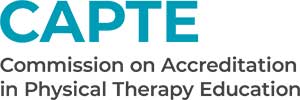Program Goals
The Doctor of Physical Therapy program will:
- Recruit and retain highly qualified students that, upon graduation, will provide clinical care and healthcare advocacy to the citizens of Maryland.
- Deliver a comprehensive curriculum that prepares students to be independent, entry-level practitioners.
- Develop students’ verbal and written professional communication.
- Cultivate a level of clinical competence to provide effective, efficient, and patient-centered healthcare in a variety of practice settings.
- Promote advancement of the physical therapy profession and lifelong learning through student participation in community health and professional activities.
Faculty Goals
The Department of Physical Therapy and Rehabilitation Science faculty will:
- Demonstrate excellence in teaching.
- Produce scholarly products that enhance the physical therapy profession.
- Participate in service to the physical therapy profession and/or rehabilitation science.
Student Goals
Doctor of Physical Therapy students will:
- Synthesize evidence, clinical experience, and patient values to support clinical decision-making.
- Examine, evaluate, diagnose, and provide appropriate interventions for client/patient management across the lifespan.
- Demonstrate clinical competence in medically complex, rehabilitation, and community-based settings.
- Communicate effectively with patients, caregivers, faculty, peers, and clinical instructors.
- Demonstrate core professional behaviors during academic courses and clinical experiences.
- Participate in service and professional activities that promote the advancement of the physical therapy profession and a commitment to lifelong learning.
Graduate Goals
Graduates of the Doctor of Physical Therapy program will:
- Function as an entry-level, independent, point-of-entry physical therapist.
- Autonomously practice in a variety of healthcare environments.
- Effectively communicate with patients, caregivers, and health care professionals.
- Contribute to the daily operations of physical therapy services (i.e. timely documentation, billing and coding, supervising PTAs and aides).
- Initiate a plan for lifelong learning and continuing competence.
- Use evidence to inform critical thinking, decision-making and clinical practice.
- Individualize plans of care based on patient-specific needs.
- Advocate for the health and wellness needs of society.
- Adhere to professionalism standards as described by the APTA Standards of Physical Therapist Practice and Code of Ethics for the Physical Therapist.
- Intend to obtain licensure and practice in Maryland.
The Doctor of Physical Therapy program at the University of Maryland School of Medicine is accredited by the CAPTE.
 Commission on Accreditation in Physical Therapy Education (CAPTE)
Commission on Accreditation in Physical Therapy Education (CAPTE)
3030 Potomac Ave, Suite 100
Alexandria, Virginia 22305-3085
Tel: 703-706-3245
Email: accreditation@apta.org
Web: www.capteonline.org
